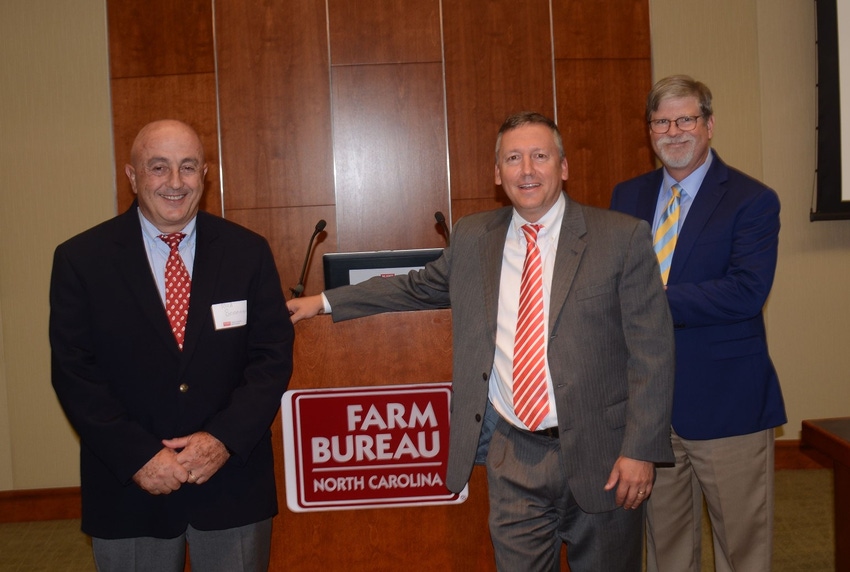
Normally in March after spring break, Patterson Hall on the North Carolina State University campus in Raleigh would be bustling with students and faculty. But in the wake of the COVID-19 pandemic, Patterson Hall is nearly vacant as is the nearby iconic Brickyard and the rest of the N.C. State campus as students and faculty teach and learn from home.
One official who does remain in Patterson Hall, the home of the College of Agriculture and Life Sciences, is Dean Richard Linton, one of a handful of personnel who is required to remain on campus. Dean Linton does note that the 117-year old building, completed in 1903, does make strange and peculiar sounds in its nearly empty state.
And while Patterson Hall and the rest of the N.C. State campus is officially closed, Linton does stress that the mission and work of both the university and the College of Agriculture and Life Sciences continue unabated. The coronavirus crisis clearly has changed the way the university and college is doing things, but Linton stresses that the work continues.
“The first priority at N.C. State is the health and safety of our students and the employees that work at N.C. State. The university is doing everything it can to minimize the opportunity of spreading COVID-19 and at the same time the college is trying to do everything we can to support agriculture and food systems,” Linton said in a March 24 interview with Southeast Farm Press.
Limited Travel
Linton does note that travel restrictions are in place which limits the ability of faculty and Extension personnel to attend meetings with most working remotely. Importantly, all classroom instruction has moved online.
Still, the research and Extension work of the College of Agriculture and Life Sciences continues. Linton does emphasize that research in the short term will be minimal and done in such a way to maximize social distancing.
He says the college is seeking university approval for more than 100 different research projects to continue where social distancing can be utilized both on campus and off campus during the crisis. He says he has high hopes that approval for the research activities will be granted.
Extension activities are diminished from a face-to-face perspective, but Linton stresses that agents are on duty responding to questions and helping stakeholders all across North Carolina. County Extension offices are closed to the public, with business being conducted by email, telephone, texts or video conferencing for the foreseeable future.
“We hope the impact on farmers will be as little as possible,” Linton says. “We are trying to do everything we can to support them.”
Social Distancing
One thing is certain, modern technology is helping. For example, farmers can use their cell phone to take a picture or video of their crop in the field and share this with a research scientist who can provide answers on the crop or pests. Linton says many farmers already do this, but he expects it to become more prevalent during this time of social distancing.
One thing Linton does emphasize is that the whole situation is fluid and can change at any time. The hope, of course, is things will return to normalcy sooner rather than later. The university is now in a wait and see situation.
“Things may dramatically change over the next few weeks. Things could get worse, but things could also get better. If things get worse, there certainly would be more restrictions. Things could also get better which would open up opportunities to be able to get more actively involved,” Linton said.
Linton hopes research station field days will still be held this summer, but the university is planning that these events may not be held. Using technology to hold the field days remotely or online is being considered.
“We are finding that these technologies that are out there are really quite amazing. The only thing we are missing is that important social touch of being there, face to face. This would be second best. At the end of the day if we can get answers and solutions and information to the farmer so that they can be informed about how to go about their growing season this year then we’ve still met our goal,” Linton said.
“Part of our land grant mission is to support our stakeholders and support our students and we are a resilient college. We are going to abide by and support the land grant mission, albeit we might do it a little bit differently over the next several months. We are going to do everything we can to fulfill the mission of a land grant university,” he added.
He said the College of Agriculture and Life Sciences is up to the challenge.
“I expect us to do things in an extraordinary but different way. We’ll step up. We’ll meet the needs of our students and stakeholders, and we look forward to getting over the rainbow when things are a little bit better and back to normal,” Linton said.
About the Author(s)
You May Also Like






